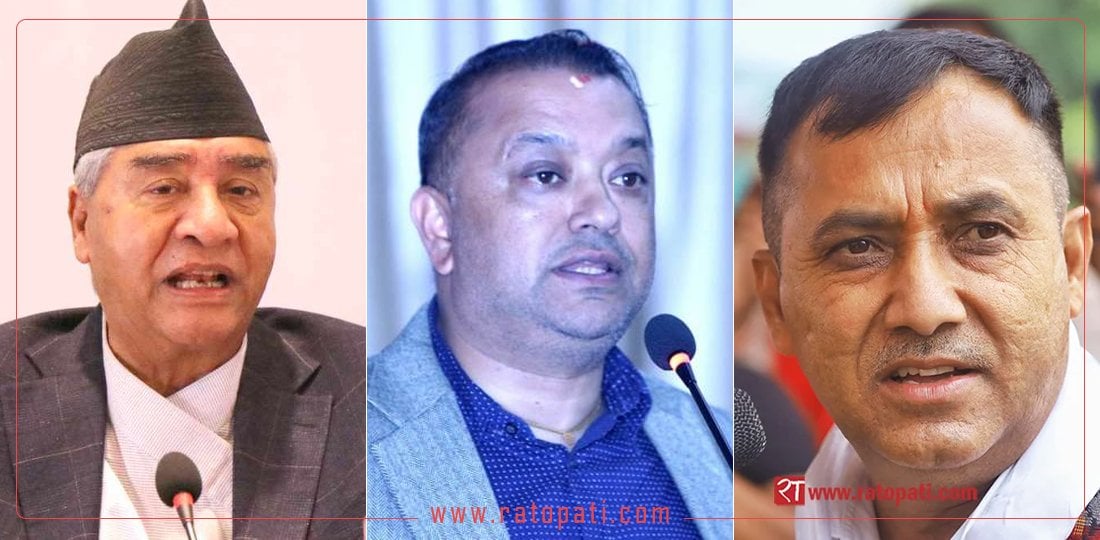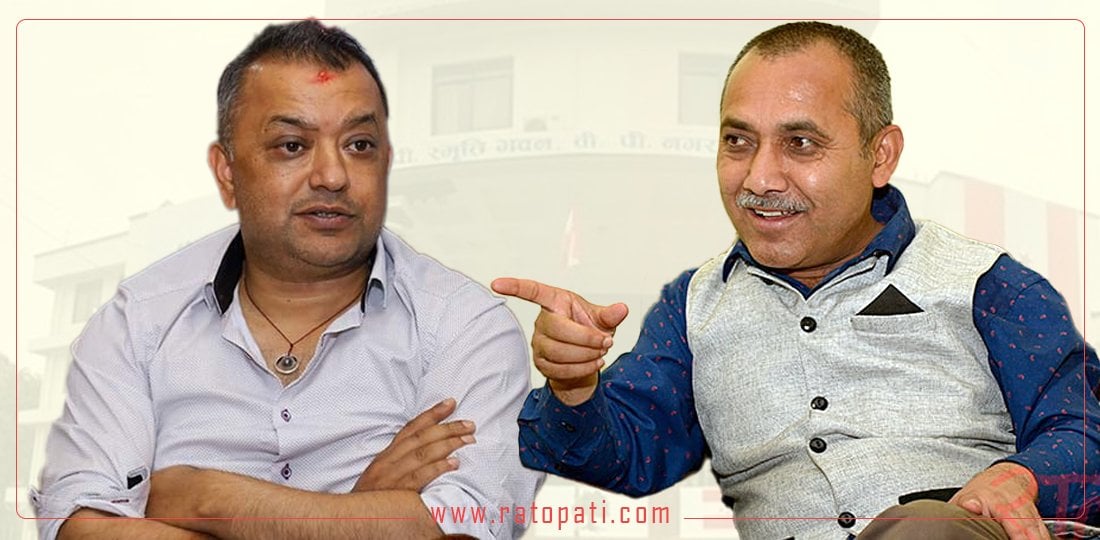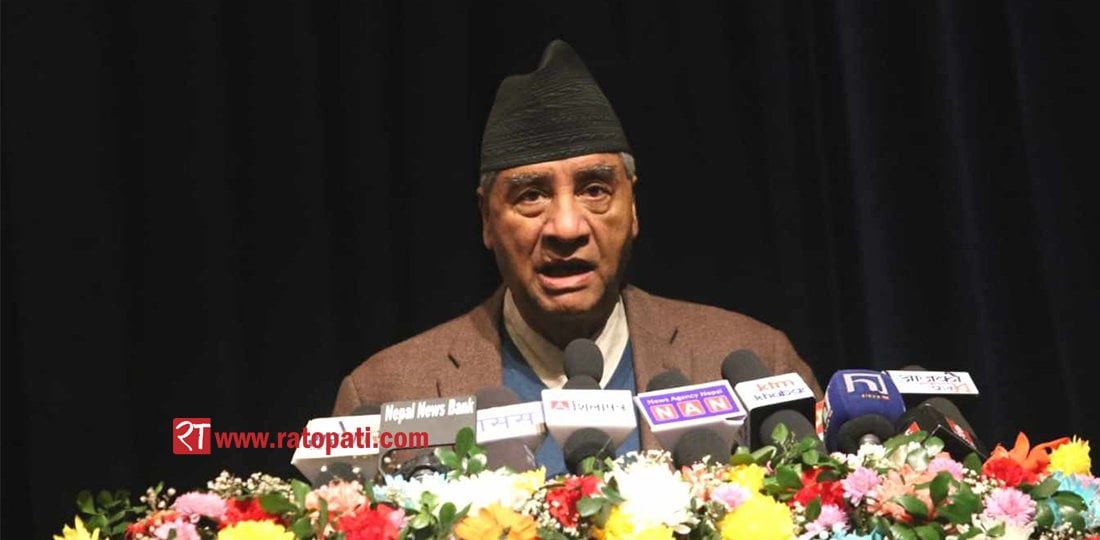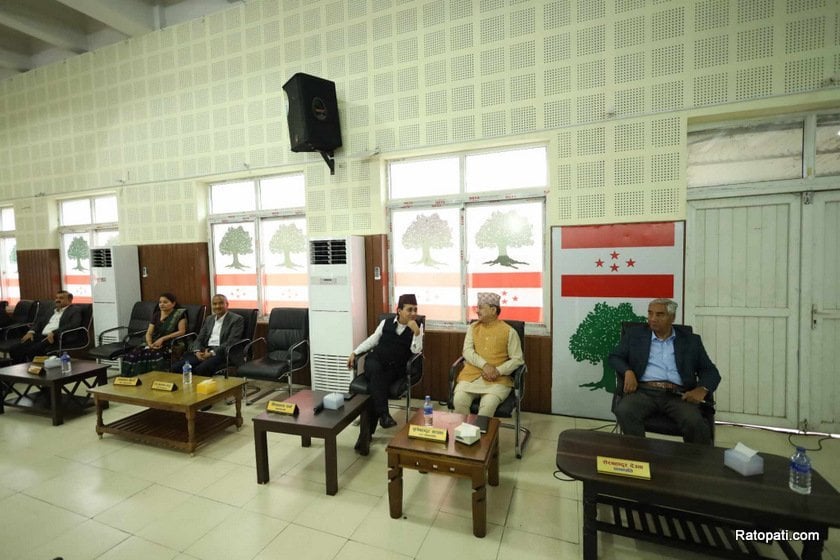Political storm brews in Nepali Congress over General Secretaries' proposal

Kathmandu, August 20 - Internal politics within the Nepali Congress party has been disrupted by the proposals put forward by General Secretary duo Gagan Thapa and Bishwo Prakash Sharma.
The party's central working committee meeting has been postponed for 11 days after President Sher Bahadur Deuba’s faction opposed proposals from Thapa and Sharma. Thapa’s proposal suggests that no pre-election alliance should be formed, while Sharma’s proposal recommends setting limits on the number of terms a person can serve as Prime Minister, Minister, or MP. The Congress meeting, which was held on August 11, is now set to take place on August 23.
The delay is attributed to Deuba's camp's efforts to undermine Thapa and Sharma's proposals. During a meeting on August 8, central committee member Arzu Rana, who is also the Minister of Foreign Affairs, opposed Sharma’s proposal. Rana argued that the number of terms for Prime Ministers should be based on experience and effectiveness rather than being limited by a constitutional provision. Her stance indicates a preference for not restricting her husband Deuba’s ability to serve multiple terms as Prime Minister.
There is significant interest among Congress members regarding whether the central committee will approve Sharma’s proposal, which seeks to codify limits on the number of terms for various positions in the party statute. Some members believe that immediately weakening Deuba’s influence within the party structure is not feasible.
Furthermore, the party establishment is also resisting Thapa’s proposal aimed at ensuring fair voting conditions by not forming any electoral alliance in the upcoming election.
Deuba’s faction, including leaders such as Bimalendra Nidhi, Prakash Sharan Mahat, NP Saud, Ramesh Lekhak, and Gyanendra Bahadur Karki, has expressed opposition to both proposals.
According to a party official, the central committee meeting has been postponed to allow time for revisions to the proposals. Deuba’s strategy involves negotiating a modified proposal with consensus by holding an unofficial meeting of the office bearers before the official meeting on August 22.
The current dispute traces back to the Mahasamiti meeting held in Godawari, Lalitpur, in February where no concrete decisions were made. The issue has since escalated and returned to the central committee. Despite expectations that amendments addressing the issues raised in the General Committee would be approved, no agreement has been reached in the past five months. Consequently, the policy proposals of Vice President Purna Bahadur Khadka, organizational proposals by General Secretary Thapa, and contemporary political proposals by General Secretary Sharma have yet to receive official approval.
Will Gagan and Bishwo yield?

President Deuba’s faction aims to revise the proposals from both General Secretaries to suit their agenda. According to some leaders, the central committee meeting has been postponed for an extended period because the General Secretaries have not complied with these requests.
Despite ongoing discussions, both General Secretaries have remained steadfast in their positions. A leader close to Thapa comments, “If there isn’t a conducive environment for voting on proposals, it raises the question of why the Congress Party is engaged in politics at all.”
Thapa’s supporters argue that if an alliance is announced prematurely, it could have damaging repercussions for the party’s strategy and effectiveness.
One leader close to Gagan questions, “If the Congress Party claims it will win elections and form a single-party government under the tree symbol, what will be the impact if we end up fighting elections under the hammer and sickle symbol instead?”
Even if the central committee votes on the proposals, there are claims that the General Secretaries will not back down. Central Committee member Prakash Snehil Rasaili believes that both reports are in the best interest of the new generation, the future of the Congress Party, and the nation as a whole.
Snehi told Ratopati, “Their reports provide a political and organizational solution for the greater good of Congress and the country. We must pass both reports to move forward.”
Deuba keeps mum as his faction becomes aggressive
President Sher Bahadur Deuba has yet to officially respond to the proposals from the General Secretaries. Instead, Deuba appears to be focused on maintaining the alliance with the UML. However, leaders close to Deuba have openly opposed both proposals.
A leader aligned with Deuba notes that Deuba has not forgotten the previous breakup of the alliance with the Maoists, which occurred due to proposals made during the Mahasamiti meeting. Deuba is reportedly inclined to keep UML satisfied rather than risk a situation with no pre-election alliance.
It is suggested that Congress and UML are not intended to contest elections together. Should there be an electoral alliance, it is expected to be with the Maoists. An official argues that such an alliance could exacerbate tensions between the President and UML.

The issues of party transformation and generational change are becoming increasingly complex. Senior Congress leaders, in particular, are concerned about their electoral prospects and the implications of codifying alliance restrictions in the party constitution.
There is, however, a strong internal push for leaders in power to adhere to policy rules and regulations. This perspective may have influenced the proposals put forth by the General Secretaries.
Establishment’s wants revision of reports
President Deuba holds the key decision-making power regarding the approval or rejection of the General Secretaries' reports. If Deuba supports the proposals, they are likely to pass; otherwise, they would not. Deuba has a majority in the central committee, but the current power dynamics within Congress suggests that the proposals might not be approved.
Party Publicity Department Chief Meen Bishwakarma argues that the relevance of the reports presented to the Mahasamiti has diminished. He doubts that the General Secretaries' proposals will pass.
Bishwokarma points out that the problem arises because the General Secretaries did not present a consensus proposal at the official meeting before the Central Committee session.

He also questions whether legislative issues will be addressed in Bishwo Prakash Sharma's current proposal or if they should be deferred until constitutional or statutory changes occur.
The Deuba camp is vigorously arguing that the majority of committee members considered the General Secretaries ' proposals irrelevant. This stance suggests that there may be amendments to the reports.
Bishwokarma acknowledges the need for adjustment and consensus on the proposals. He indicated that while there is appreciation for the spirit of the report, final decisions will depend on whether adjustments can be made to align with party interests.
Despite the tensions, President Deuba appears to be aiming for a resolution without escalating conflict over the proposals.










Leave Comment